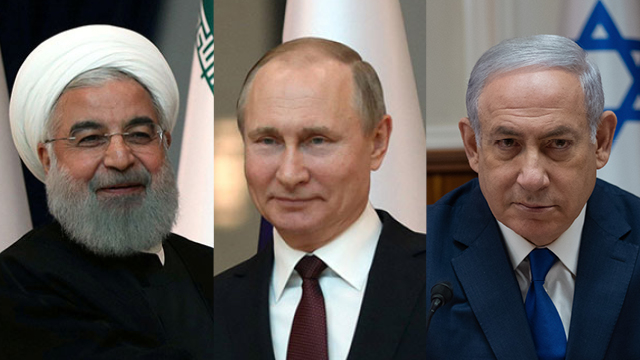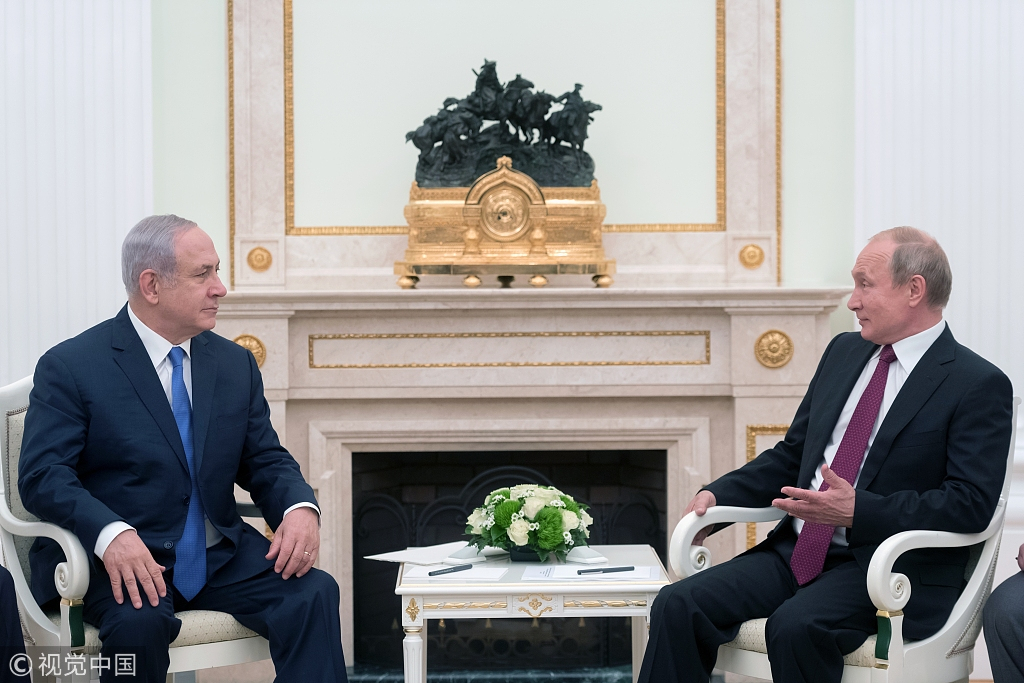
Opinion
12:30, 20-Feb-2019
Can a deal be reached on Iran’s military presence in Syria?
Hua Wang

Editor's note: Dr. Hua Wang is a researcher in Comparative Politics at the University of Glasgow, Britain. The article reflects the author's opinion, and not necessarily the views of CGTN.
The Syria War has lasted for almost eight years since 2011, causing millions of civilians to become refugees or displaced. Up until now, the war in Syria has gone beyond a civil war between the Syrian government and rebels, but a wresting field for large powers contest. Can Iran, Israel and Russia, the three outside actors with the most significant strategic interests in the country, possibly reach an agreement and bring the peace back to Syrian people?
Earlier this month, Israeli Prime Minister Benjamin Netanyahu said he would meet with Russian President Vladimir Putin in Moscow on February 21. It would be the first meet between the two leaders since Israel shot down the Russian plane in September 2018. Netanyahu said this visit would deal with Israel's efforts to prevent Iranian entrenchment in neighboring Syria, which sent a message to the outside world that a bilateral agreement on Iran's role in Syria might be reached in the meeting. Nevertheless, due to years of irreconcilable contradictions and conflicts, the decision might be easy to make, but hard to implement.

Russian President Vladimir Putin (R) meets Israeli Prime Minister Benjamin Netanyahu in Moscow, July 11, 2018. /VCG Photo
Russian President Vladimir Putin (R) meets Israeli Prime Minister Benjamin Netanyahu in Moscow, July 11, 2018. /VCG Photo
To better and comprehensively understand the situation, we need to analyze the strategic interests of the three parties.
Russia's interest in the Middle East, especially in Syria, lies in its willingness to aid an ally, the wish to maintain influence and reputation in the region and challenge the U.S.'s role in the world.
Israel doesn't have a much economic or political interest in line with Syria. However, it does have critical security interests that it seeks to advance in Syria-principally, minimizing Iranian and Russian influence in Syria, blocking the transfer of advanced weapons to Hezbollah, preventing Syria from posing a credible military threat to Israel or permitting Iran to do so, undermining the legitimacy of Syria's claims to the Golan Heights, and preventing Sunni militants from establishing infrastructure or operational bases along Israel's border, according to a report by Larry Hanauer in LAND.
Iran and Syria's relationship is based on a unique convergence of interests. Iran and Syria both resent the U.S. influence in the Middle East, and have supported Palestinian resistance against Israel. They also went through a bitter struggle against their common enemy, the Iraqi dictator Saddam Hussein.

Iranians burn flags of Israel and the U.S. during commemorations of the 40th anniversary of Islamic Revolution in Tehran, February 11, 2019. /VCG Photo
Iranians burn flags of Israel and the U.S. during commemorations of the 40th anniversary of Islamic Revolution in Tehran, February 11, 2019. /VCG Photo
I would say, among the three outsider actors, the key sally port to improve the Syrian situation is the Iran-Israel relations. However, Iran and Israel are sworn enemies, and Syria is the most dangerous front in their bitter rivalry. Since the Iranian revolution in 1979, Iran's leaders have called for Israel's elimination. Iran rejects Israel's right to exist, considering it an illegitimate occupier of Muslim land. Israel, in turn, regards Iran as a threat to its existence and has always said Iran must not get a nuclear weapon. Israeli leaders are worried by Iran's expansion in the Middle East as well. The conflicts between Iran and Israel are irreconcilable, which largely blocks the peace process in Syria.
Though the meet between Netanyahu and Putin seems promising, yet the deep contradiction and potential battle among those countries are impossible to eliminate. This probably could explain why Russian plane got targeted last year, even in the context of Israel and Russia maintaining a hotline to prevent their air forces from clashing over Syria.
The common interests shared by Jerusalem and Moscow might be enough for a compromise, but not enough for making a real deal.
(If you want to contribute and have specific expertise, please contact us at opinions@cgtn.com.)

SITEMAP
Copyright © 2018 CGTN. Beijing ICP prepared NO.16065310-3
Copyright © 2018 CGTN. Beijing ICP prepared NO.16065310-3